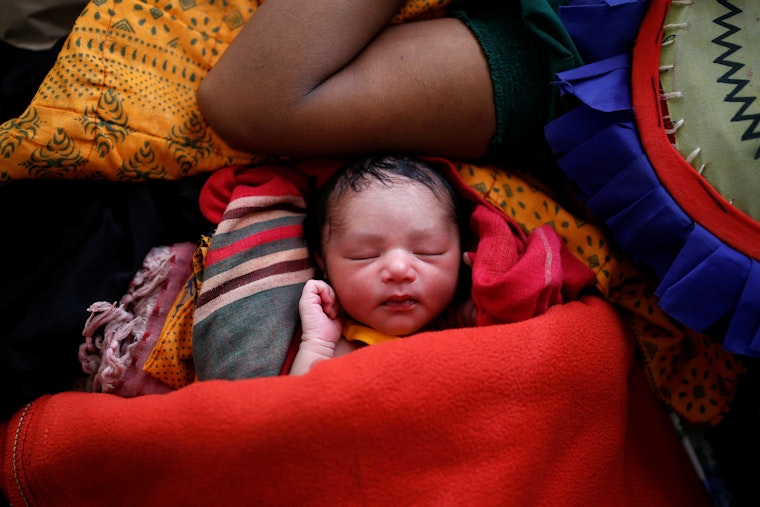Saving Newborn Rohingya from a Legal Abyss
By Natasha Arnpriester

Media coverage of the Rohingya humanitarian crisis has predominantly focused on the high number of refugees fleeing Myanmar for Bangladesh and the devastation being wrought there this monsoon season. Yet a hidden crisis—an identity crisis—is also percolating beneath the surface of this vast encampment (which is currently the largest refugee settlement in the world).
Since August 2017, over 700,000 members of this Muslim minority group have arrived in Bangladesh, fleeing systematic and targeted violence perpetrated against them in the country’s Rahkine State. The majority of those who have arrived in Bangladesh are women and children. Tens of thousands of these women are pregnant and, according to the UN, at least 60 Rohingya babies are born every day.
However, birth registration is not taking place for Rohingya newborns, which means they are entering the world without official proof of their legal identity.
Identity is an innate, undeniable, and indivisible part of being human. Human rights law guarantees recognition, from the moment of birth, of every person’s existence. Birth registration is a primary and crucial way to recognize an individual’s legal identity, as it can serve as evidence of a person’s right to acquire citizenship, documenting the location and date of birth, as well as a parent’s identity. Birth registration is also often a necessary conduit to accessing one’s human rights, such as the right to receive an education and medical care. In the Rohingyas’ case, it can also provide a documented connection to their homeland, aiding their right to return to Myanmar, should they feel safe to do so.
When individuals are invisible to governments and have no way of proving who they are, they become vulnerable to a multitude of abuses. By documenting a child’s age, birth registration can serve as a bulwark against child abuse and exploitation—such as underage marriage, sex trafficking, child labor and military recruitment. The invisibility of unregistered children makes them more vulnerable, because it increases the likelihood that such abuses of their rights will go unnoticed and unpunished.
Myanmar does not recognize the Rohingya as one of the country’s ethnic minority groups, despite the fact that they have inhabited the territory for generations. Such repudiation excludes the Rohingya from the fundamental human right of citizenship, effectively rendering them stateless, and invisible in the eyes of society. Deprived of citizenship recognition from their home country of Myanmar, and denied legal identity recognition in their host state, the thousands upon thousands of Rohingya babies born in Bangladesh are living in limbo—which only serves to continue the Rohingya community’s enduring invisibility before the law.
Article 7 of the Convention on the Rights of the Child and Article 24 of the International Covenant on Civil and Political Rights guarantee birth registration immediately upon birth. UN Sustainable Development Goal 16.9 calls on states to provide proof of legal identity for all, including that of birth registration. So, too, do the UN Global Compacts and New York Declaration for Refugees and Migrants. Bangladesh is subject to obligations and commitments under every single one of these instruments. Moreover, the law in Bangladesh is unequivocal: all children born in the country—including “any refugee taking shelter in Bangladesh”—must be registered.
In April 2018, the government of Bangladesh and the UN Refugee Agency (UNHCR) negotiated a confidential agreement, which included a provision on the registration and documentation of births within the Rohingya refugee populations on the territory of Bangladesh. Yet no Rohingya newborn has been registered or issued any such documentation under this agreement; and, by all accounts, the government has not operationalized the provision. Successive undertakings and statements have been made since April—nevertheless, newborn registration has not taken place.
Although birth registration is not sufficient to guarantee a child’s protection, it is an essential line of defense. The Rohingya community has been plagued by decades of statelessness and its accompanying ills, and withholding birth registration from this new generation only serves to perpetuate the vulnerabilities this community faces, which are compounded by the tribulations of forced, and likely prolonged, displacement. Depriving newborns’ right to birth registration strips Rohingya children of legal recognition of their identity, which not only places them at immediate risk of abuse and exploitation, but also relegates them to a future of marginalization and invisibility.
Natasha Arnpriester is an advocacy officer with Open Society Justice Initiative.